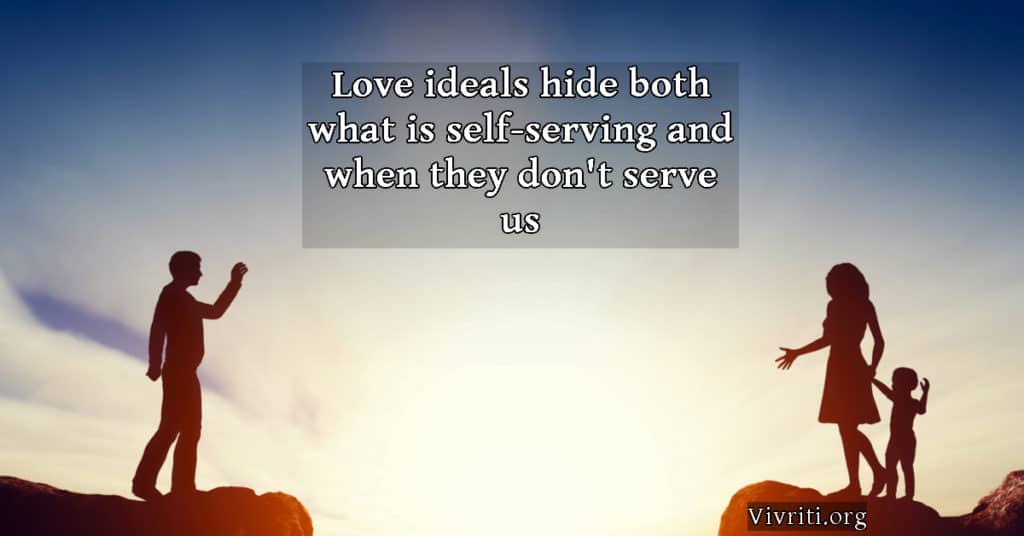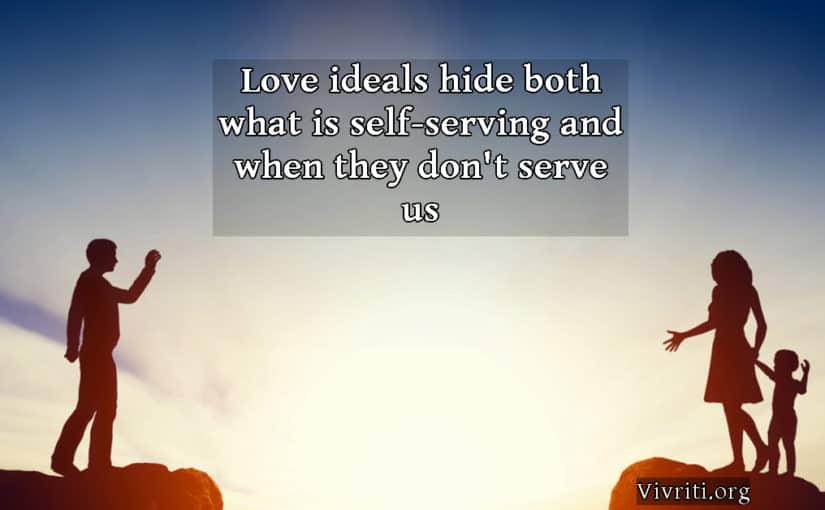 Intimate relationships and love ideals are a touchy topic anywhere, but the consequences of marriage, relationship breakups, and vengeance for rejection should make us willing to scrutinize our beliefs. Ideals should not blind us to facts. In some countries, divorce is almost impossible due to the force of custom, but custom itself does not make any belief true.
Intimate relationships and love ideals are a touchy topic anywhere, but the consequences of marriage, relationship breakups, and vengeance for rejection should make us willing to scrutinize our beliefs. Ideals should not blind us to facts. In some countries, divorce is almost impossible due to the force of custom, but custom itself does not make any belief true.
Love ideals tend to hide when the ideals are merely self-serving and when they, in fact, don’t serve us
- We forget concepts are mental and treat love ideals as facts.
Love ideals are conceptual and like the concept of a sweet cake, we never taste the conceptual cake and this metaphor holds true regardless of cultural differences. So much of human happiness and misery rests on our beliefs that we should dare question them to see if flaws or falsehoods lay hidden.
“To be forced to stay in a marriage for fear of criminal consequences smells of a totalitarian society, and not of the modern liberal tenets that inform our Constitution.”1
- To impose staying together for the sake of family bypasses the question, is something else better for the family?
We invite misery if we force a union. If we put aside the love ideals and ask whether it is good being with someone we don’t want to be with, then the answer seems obvious. Is it good for children to live in a house with parents who merely tolerate and neglect each other or worse, loathe each other? Arguably, unhappy unions often lead to infidelity and various types of divorces and separations. Recently, two Muslim brothers divorced their wives using WhatsApp, sending the divorce message “Talaq, Talaq, Talaq.”2
Make Your Own Decision.
See for yourself while you live.
Find your own place.
Dead, what house will you have?
Creature, you don’t see
your opportunity.
In the end, no one belongs to you.
Kabir says, it’s difficult,
this wheel of time.3
- The unfairness to women in terms of sexual transgressions are glaringly clear; Still women (like men) hope for pleasure as part of a good life.
The sexual biological impulse blossoms on a vine of life that stretches back to the first evolutionary sparks of life. That impulse does NOT exist to serve our prejudices or our love ideals. The sexual impulse often proves stronger than the ideals of our culture.
“It is abhorrent that a married man has the right to have proprietary control over his wife, while there is no deterrent to his engaging in a romantic relationship with an unmarried woman.”4
- We shouldn’t treat biological imperatives simply as means to achieve our ideals.
I ask, what kind of relationship adapts to the real people with whom we share our lives? What kind of relationship allows for more happiness? If love relations exist beyond the bounds of our love ideals then the ideals need to change or they rob us of possibilities.
We see how different our relationships are from our parents’ and grandparents’ and, undoubtedly, if human life continues, the human race will continue to adapt in how we meet and love each other. Those of us living don’t have one or two centuries to wait for better options. We either venture outside of the traditions or we don’t, and there will be a variety of results for either choice. My hope is that, whatever we choose, we do not impose upon others with coercion, deceit, recklessness, or violence. We don’t abuse the power that intimate relationships grant upon those people involved. This means approaching intimate relationships with an open mind and a recognition that happiness and misery are at stake.
“Many people simply assume [that] the ‘best way to satisfy sexual desire is to have sex after marriage, which, in turn, suggests that marriage is superior to other alternatives. Consider just one of [the] many consequences for believing that nuptial vows somehow ‘legitimize’ sexuality; make it ‘respectable.’ Such a belief may lead young people headlong into a destructive marriage, particularly if they have strong sex drives. It’s deceptive to exaggerate idealistic wedded living and allure young people with fictions that don’t indicate reality.
Many people experience the dissolving of nuptial contracts with its awful cost and pain. Candid conversations imply that many people simply endure marriage. Frequently, people who exalt matrimony deceive their spouses.”5
Orthodox societies typically seem unwilling to accept live-in relationship experiments, meaning trial and error. Regardless, the orthodox have always grappled with useless suffering, infidelity, and the universal custom of prostitution regardless of their love ideals.
In more orthodox societies the tendency exists to encourage women to stay ‘with an abusive and violent partner, even by their own natal families, rather than exiting a marriage’,6 this leaves women in desperate positions, this is a failure to adapt. The more dogmatic the views, the less the chance to even discuss the topic rationally. Such an approach encourages living in unsatisfying routine i.e., dead relationships and the misery of a stifled human life. Not just for the women, but for the men, too.
“Love can flourish only as long as it is free and spontaneous; it tends to be killed by the thought of duty. To say that it is your duty to love so-and-so is the surest way to cause you to hate him or her.”7
When we enjoy love given freely, we have some of what is best in life. The access to our love need not be mediated through love ideals or the opinions of others who will neither live through the difficulties of our life or die our death for us. If we feel a longing to reach for what is best in life, then we should extend that freedom to our beloved, too. This does not guarantee any particular outcome, instead it gives great respect for life, for discovery and happiness.
By Todd Vickers
1 Malavika Rajkotia, “By Jane Borges discussion of the book Intimacy Undone,” Mid-Day.com, March, 5, 2017, http://www.mid-day.com/articles/sexless-marriage-divorce-lawyer-book-loopholes-indian-law-love-sex-and-dhoka/18046198.
2 Prabhash K Dutta (Ed.), “Hyderabad: 2 Muslim women divorced over WhatsApp by US-based husbands,” India Today,” March 4, 2017, http://indiatoday.intoday.in/story/triple-talaq-hyderabad-whatsapp/1/896799.html.
3 Todd Vickers, The relevance of Kabir (Vickers Publications, 2015), https://vivriti.org/bookstore.
4 Malavika Rajkotia, “By Jane Borges discussion of the book Intimacy Undone,” Mid-Day.com, March, 5, 2017, http://www.mid-day.com/articles/sexless-marriage-divorce-lawyer-book-loopholes-indian-law-love-sex-and-dhoka/18046198.
5 Todd Vickers, “New arguments against abstinence-only sex education,” NoShameInSex.com, November, 9, 2014, http://noshameinsex.com/culture-critique/new-arguments-against-abstinence-only-sex-education.
6 CP Chandrasehar, & Jaytati Ghosh, Women and marital breakdown in India, TheHinduBusinessline.com, February 27, 2017, http://www.thehindubusinessline.com/opinion/columns/c-p-chandrasekhar/women-and-marital-breakdown-in-india/article9562333.ece.
7 Bertrand Russell, Marriage and Morals, (Routledge Classics, 2009).

One reply on “Four reasons to question marriage love ideals”
[…] “To be forced to stay in a marriage for fear of criminal consequences smells of a totalitarian society, and not of the modern liberal tenets that inform our Constitution.”1… Read more at Vivriti.org […]